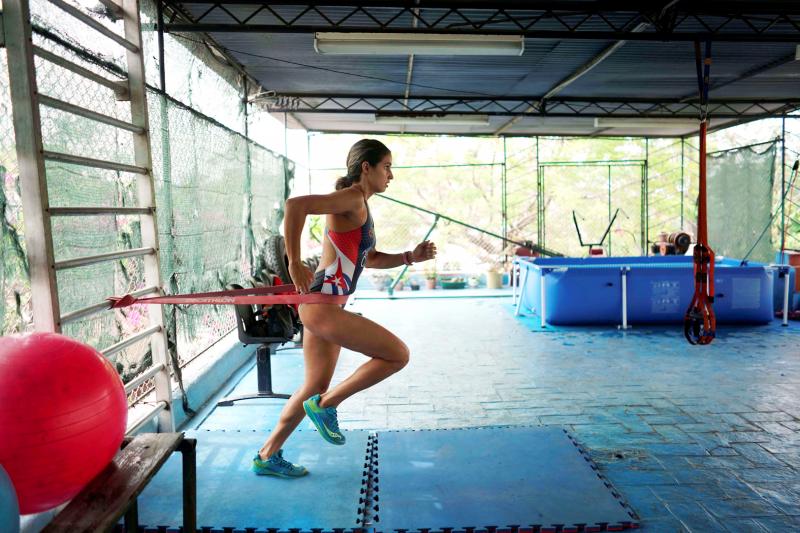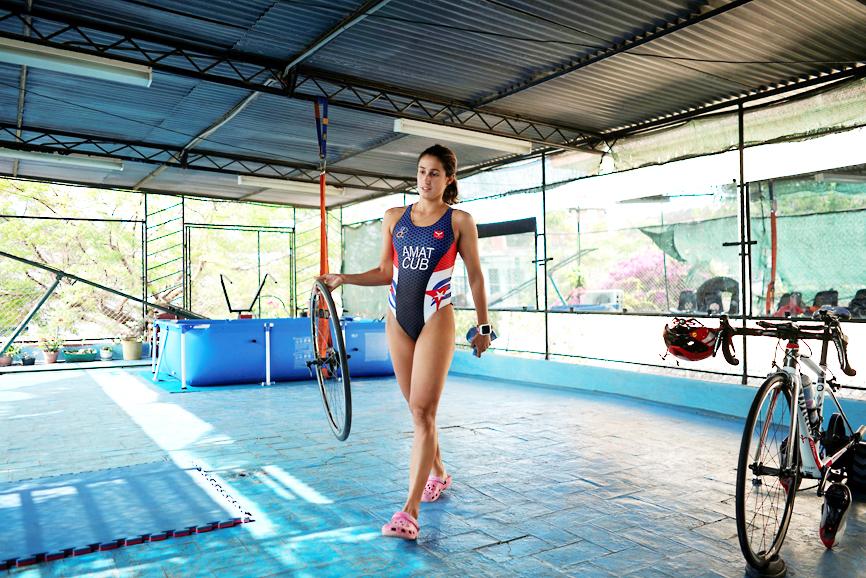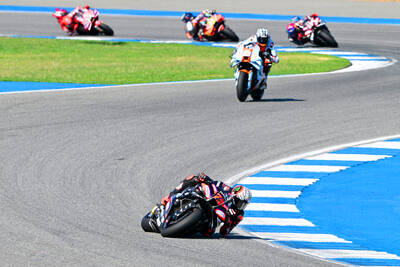A triathlete swims in a tiny above-ground pool on her rooftop, her waist attached to the wall with resistance bands, while a baseball player bats into a car tire and a boxer throws his punches into a bag of rice hanging from a mango tree.
In cash-strapped Cuba, famed for its resourcefulness as well as its sporting prowess, professional athletes are inventing ways to work out and practice, despite the closure of common training grounds due to the COVID-19 pandemic.
With most on state salaries of less than US$40 per month, they cannot afford professional equipment at home. Nor would that be easy to acquire in a country subject to trade embargos and where the state has a monopoly on imports.

Photo: Reuters
“I’ve had to invent,” said triathlete Leslie Amat, 27, sweating profusely after a full workout on her Havana home’s rooftop that is lined with potted plants.
In one corner is the 3m-long pool that her trainer’s nine-year-old daughter lent her when authorities last month closed down the Olympic-sized pools she usually trains in as the virus started to spread in the Caribbean country.
Using bands attached to the wall, she swims in it every day for 30 minutes. Then she runs on the spot using the same method, before hopping onto her road bike made stationary with a stand — her one piece of professional equipment.

Photo: Reuters
Amat also created a separate contraption, a wooden board tilted at a 45° angle on tubes, to allow her to improve her upper-body strength. She leans against it and pulls herself up and down with straps.
A video of her improvised workouts, accompanied by the hashtag #quedateencasa (“stay at home”), went viral on social media this week.
Baseball player Santiago Torres has taken to hitting a car tire with a bat to keep up his strength now that he cannot use the automated pitching machines at the training facility of his team, Santiago de Cuba.
“I’ve been keeping active at home, doing defense exercises with rubber balls and also swinging the bat,” he said in a state television report.
For such athletes, suspending training until Cuba ends its lockdown is out of the question.
“My dream is to get the Tokyo Olympic Games,” said Amat of the Games that were postponed to next year.
To qualify for the Cuba team, she still needs to score well in a few races.
Meanwhile, she is one of the star participants in a “race at home” today created by the organizers of the Varadero half marathon. Participants are being asked to run 1km to 3km at home, whether around their garden or on the spot, and to post photos and videos on its Facebook page.
“In these difficult times we need to be very creative,” Amat said. “Always remember this will pass and continue with our personal goals.”

Fenerbahce on Thursday earned a rare 2-1 win in England, but were still knocked out of the UEFA Europa League by Nottingham Forest in the playoffs. Forest entered the second leg with a healthy 3-0 lead from the opener in Istanbul — where Vitor Pereira made an impact in his first game in charge — and that proved enough to advance to the round-of-16 with a 4-2 aggregate score. The result was a boost for Forest, struggling at 17th place in the Premier League, in their return to Europe after three decades. They next face Real Betis Balompie or Kerem Akturkoglu gave Fenerbahce

The Cleveland Cavaliers on Tuesday emphatically got back to winning ways in the NBA, coasting to a 109-94 victory over the New York Knicks as their recent star signing, James Harden, scored 20 points. The Cavs took the lead barely a minute into the game with an Evan Mobley three-pointer and never gave it up in a thoroughly comfortable night for the red-hot Ohio franchise. Former NBA Most Valuable Player (MVP) Harden, who was brought in from the Los Angeles Clippers this month, has never won a championship, despite being one of the most decorated players in the league. That was a key

Soccer officials yesterday offered “full support and assistance” to the Iranian team in Australia for the AFC Women’s Asian Cup after the US and Israel launched massive attacks on their homeland. Iran’s 26-strong squad arrived on the Gold Coast days before the strikes on Saturday killed supreme leader Ayatollah Ali Khamenei, as Washington and Tel Aviv seek to topple the Islamic republic. They are due to open their tournament today against South Korea. The AFC in a statement said it “continues to closely monitor the recent developments in the Middle East during this challenging period.” “The AFC’s foremost priority remains the welfare, safety and

ROAD RASH: Marc Marquez retired after a crash, marking the first time after 88 consecutive races stretching back to 2021 that a Ducati bike failed to make the podium Marco Bezzecchi yesterday won the MotoGP season-opening grand prix in Thailand from pole position as defending world champion Marc Marquez retired late with a buckled wheel. Aprilia’s Bezzecchi led from start to finish to top the podium in Buriram, with KTM’s Pedro Acosta second and Trackhouse’s Raul Fernandez third. Ducati’s Marquez is chasing a record-equaling eighth world title this season, but he exited the race in dramatic fashion while in fourth place with five laps to go. The Spaniard, who started from second on the grid, took a corner wide, with the jolt to his bike dislodging the rear tire, badly damaging his